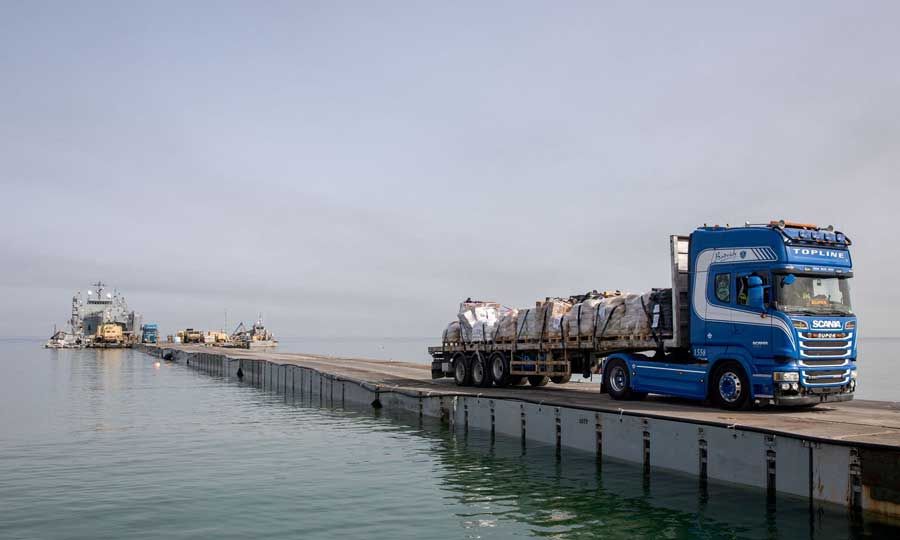
Newsroom
Humanitarian aid intended for the desperate population of the Gaza Strip remains undistributed, despite its arrival at a temporary port constructed by the U.S. military. The enclave faces the looming specter of famine amidst the ongoing conflict between Israel and Hamas, according to statements from the U.S. Defense Department on Tuesday.
The aid, which arrived via Cyprus, was promised to be swiftly distributed by U.S. authorities last week. However, the distribution process has been hindered, particularly since Israel's military took control of the Palestinian side of the crucial Rafah crossing on the Egyptian border on May 7. As a result, food deliveries to Gaza have significantly dwindled.

Pentagon spokesman Pat Ryder expressed concern, stating, "I don't believe any of the 569 tons of aid that has arrived there has been distributed." While some aid has made its way to warehouses, reports indicate that desperate Palestinians have seized aid from trucks, reflecting the dire humanitarian situation after more than seven months of conflict.
Ryder emphasized the challenges of operating in a war zone, noting, "We are well aware that land routes are the best way to deliver aid." He underscored the complexity of the operation, given the ongoing conflict.
Earlier this week, Cypriot authorities announced that four U.S. and French ships had set sail from the Port of Larnaca, carrying aid destined for Gaza. Contributions from Britain, the U.S., the United Arab Emirates, and other nations are also stationed off the coast of Cyprus, awaiting delivery.
Cyprus President Nikos Christodoulides hailed the collaborative effort, stating that "third countries" were offering significant support to the operation, which he deemed to be progressing positively.

The United Nations has also raised alarms about the potential consequences of obstructing aid deliveries to Gaza. Martin Griffiths, the UN's deputy secretary-general for Humanitarian Affairs, warned of "apocalyptic" outcomes if access to Gaza continues to be impeded.
In response to the challenges posed by land-based aid deliveries, Israeli pacifists escorted a convoy of aid to Gaza over the weekend, aiming to prevent its destruction by far-right militants—a scenario that has unfolded several times before.
The decision to establish the temporary port was made in March by the United States, acknowledging the difficulties of delivering aid via land routes controlled by Israel. However, the initiative has been met with criticism from UN agencies, NGOs, and officials within President Joe Biden's administration, who deem it insufficient in addressing Gaza's humanitarian crisis.
Despite efforts to alleviate the situation, the Rafah crossing remains closed, hindering the flow of aid into Gaza. Stephane Dujarric, spokesman for UN Secretary-General Antonio Guterres, highlighted the impact of the closure, estimating that it has prevented the entry of approximately 82,000 tonnes of supplies, including vital food and medicine.
While some humanitarian transit points remain operational, challenges persist due to ongoing fighting and logistical difficulties. Concerns have been raised about the worsening conditions in Gaza, particularly in areas such as Jabalia and Eastern Rafah, where heavy fighting has taken a toll on civilian populations.

Amidst the turmoil, humanitarian organizations struggle to maintain essential services, with reports indicating shortages of medical supplies and limited access to health facilities. The World Health Organization has voiced deep concern for the safety of patients and medical staff in Gaza, where hospitals remain under siege, preventing the entry and exit of individuals.
As the situation in Gaza deteriorates, calls for a ceasefire and renewed diplomatic efforts grow louder. Tor Wennesland, Special Coordinator for the Middle East peace process, urged all parties to redouble their efforts and return to the negotiating table to prevent further escalation of tensions in the region.
In the midst of the ongoing crisis, the plight of the civilian population in Gaza remains a pressing concern, underscoring the urgent need for international intervention and concerted efforts to address the humanitarian catastrophe unfolding in the region.































